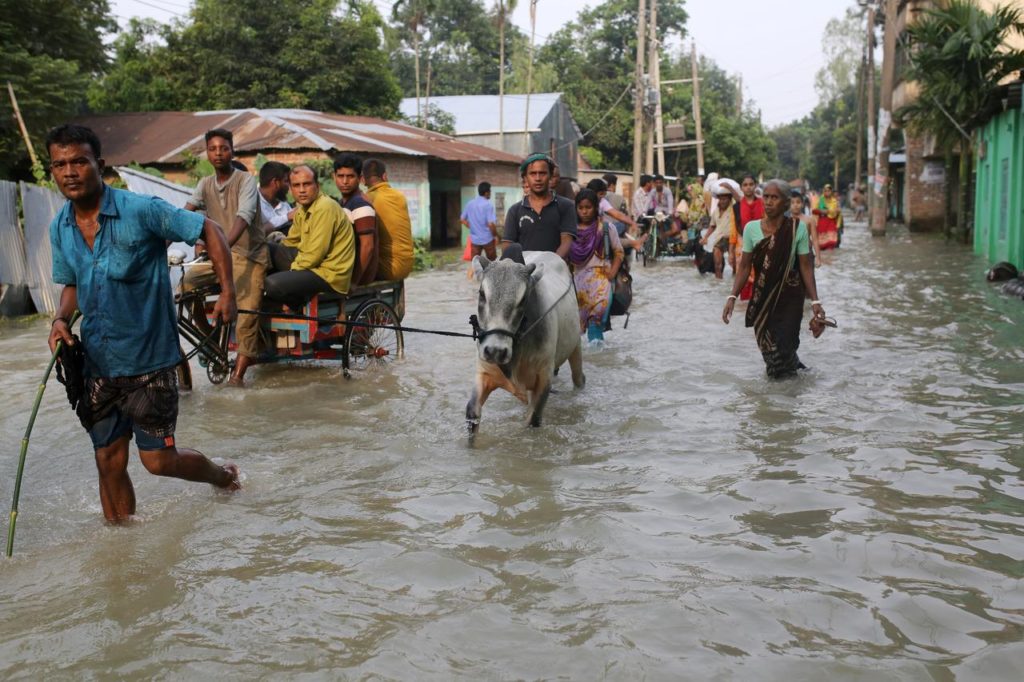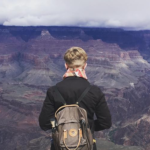One third of Bangladesh is currently underwater due to torrential monsoon rains which started in June. The flooding has displaced 4.7 million, the majority of whom are the working class and rural poor who live in informal, thatched housing. These individuals already lead precarious lives, and they’re forced to relocate to higher ground almost annually when the monsoon season arrives. At least 100 have died since June, and the rains will likely continue until mid-August. Bangladeshis are already struggling to recover from the devastation caused by Cyclone Amphan in May, as well as the continuing coronavirus pandemic. Climate change will only exacerbate these extreme weather events, while capitalism ensures that the world’s poorest will pay the price.
Satellite photos from NASA show the shocking scale of the submersion. At least one million homes have been flooded or even washed away, taking with them assets like animals and savings. In the worst cases, the flood also takes family members: many of those who’ve drowned were children. Over 1,500 square kilometers of farmland have been damaged, destroying crops and livelihoods. Flooded roads have also left many rural villages isolated, which complicates relief efforts.
Other crises leave Bangladeshis especially vulnerable during the current flooding. In May, Cyclone Amphan pummeled the Bay of Bengal with heavy rains and 110 mph winds. It killed over 100 people and destroyed villages, fishing communities, and livelihoods. Bangladesh is also experiencing the coronavirus pandemic, with over 3,100 deaths so far. Due to the government’s lockdown measures, many had already lost their jobs, and are now left with few resources during the flooding. Bangladesh also has a large refugee population, including over one million Rohingya refugees from Myanmar. Cox Bazar is the largest such refugee camp — the largest refugee settlement in the world, in fact — and is particularly prone to flooding due to its coastal location.
Volatile weather is nothing new for the 167 million residents of Bangladesh. 80% of the country’s rainfall occurs between June and October — the monsoon season — and flooding is common, especially around the Brahmaputra and Meghna rivers. Located in the Bay of Bengal, most of Bangladesh lies in the Ganges Delta, a hotbed for cyclones and storm surges due to its shallow, warm waters. The monsoons usher in flooding every year; however, the floods have worsened in recent years and the unrelenting rain has stayed progressively longer. Dr. Saleemul Huz, director of the International Center for Climate Change and Development in Bangladesh, said, “I think this is definitely linked to climate change. This is a one in 20-year flood event that we are having now for the fifth time in the last 20 years.”
Other geographical characteristics make Bangladesh particularly prone to experiencing the disastrous effects of climate change. Most of Bangladesh is extremely low-lying and is within a mere seven feet of sea levels. By 2050, rising sea levels may swallow up to 17% of the land and displace 20 million people. By the end of the century, sea levels may rise by up to five feet. Bangladeshis whose towns are not inundated or washed away by the rising sea will struggle to survive as salinated water alters the land and its fertility, making it hard to grow crops. These circumstances have forced millions to flee their homes for cities like Dhaka where they make a meager living in low-paid, menial jobs.
The extreme weather events in Bangladesh, coupled with rising sea levels, expose the cruel injustice of climate change: The poorest suffer the consequences of the overconsumption and high emissions of the rich. The top 10% of the wealthiest people are responsible for over 50% of global carbon emissions, while the poorest 50% of people are responsible for only 10%. The average person in the U.S. is responsible for 33 times more carbon emissions than the average person in Bangladesh. Scientists have even issued a “warning” on wealth, arguing that affluence is a barrier to solving the climate crisis.
Individuals in the Global South in countries such as Bangladesh face a double-whammy of climate devastation and resource-depletion due to centuries of imperialism. Hundreds of millions of people in the Global South will be displaced by climate change, and climate refugees have already begun an exodus out of affected areas. Unless we take urgent action to address wealth inequality and climate change, devastating flooding events like the ones hitting Bangladesh will continue unabated. The working class must show international solidarity, and demand that capitalists pay for their role in environmental destruction.











